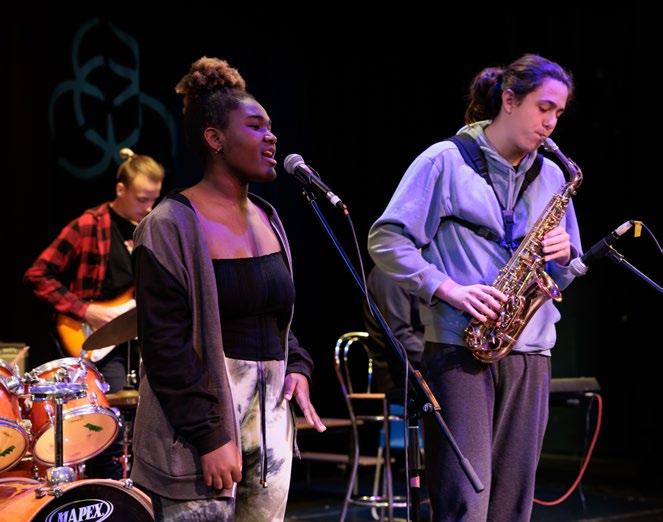
2 minute read
Music Practitioner
Level 3 Subsidiary Diploma | RSL
Students of Music Practitioner course will engage with a range of real life music experiences through a practical course based around industry practice. They cover a range of units like ‘Rehearsal Skills’, ‘Live Music Performance’, ‘Studio Recording’, ‘Studio Mixing’ and there is an element of choice in putting together units to best suit the interests and capacity of individual students.
Advertisement
The Music Practitioner suite of qualifications lead on well to more vocational type music degrees in popular music especially. However, the skill set learnt through evidencing progress throughout, building strong creative and team work skills, developing capacity with music technology, and building of leadership qualities offer support to many routes for further study or work.
There are a wide variety of ensembles for students to be involved in within school and also opportunities to form own bands and groups, as well as using the excellent music facilities in own time. Students are encouraged to access the wide range of concerts and events locally. They are also encouraged to perform in both school events and outside in the community.
All assessment is through coursework portfolios and many of the unit’s cross over with each other. Students build up their skill set gradually, and when secure with new skills, they submit units of work for assessment. There is a process and structure where staff can give clear feedback, and students can then rework their portfolios. We offer this course at Subsidiary Diploma level initially (equivalent to one A level), and with strong and committed candidates some will move onto the full Diploma during the course and gain a double A level equivalent qualification. This requires an additional 2 full units of work. All units are graded at Distinction, Merit or Pass. For the Subsidiary Diploma there will be a minimum of 6 units and we tend to cover three performance based units and three technology units. If students are keen composers, or active listeners, or keen to lead others in music making then we choose additional units for them to match their interests and skills.
The beauty of the course is its flexibility and that students have a great deal of choice in content for their learning.
Progression Opportunities
Subject Visits and Enrichment Opportunities
Assessment Overview Entry Requirements

• Grade 4 in Music or • Music Practitioner or BTEC level 2 Merit or above, or considerable independent experience of music.
If formal music has not been studied before then a discussion will be needed to judge capacity for the course.










